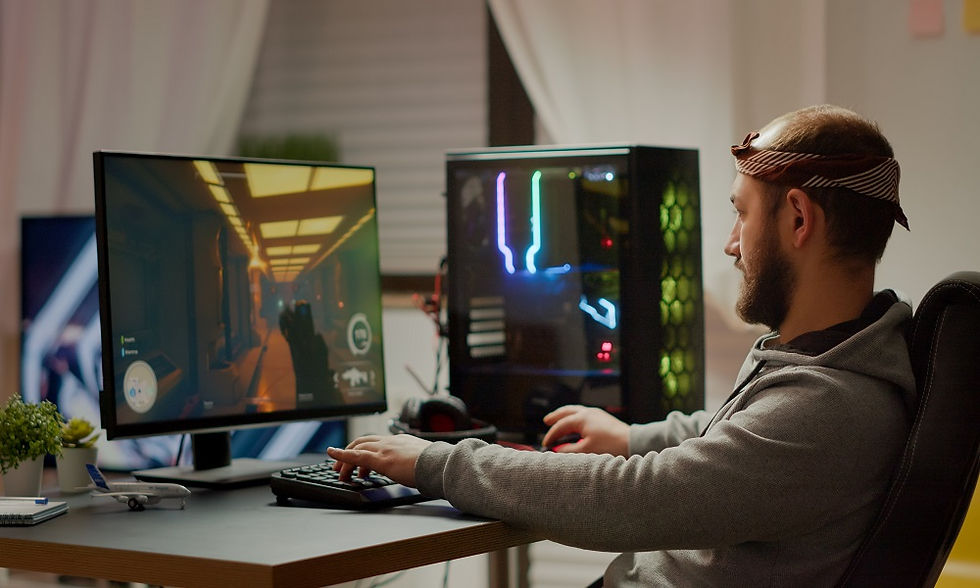Unity Engine 101: Mastering Game Development Techniques
- The UpThrust
- Aug 1, 2024
- 3 min read

Unity is one of the most popular game development engines, known for its powerful features, cross-platform capabilities, and user-friendly interface. Whether you're a beginner or an experienced developer, mastering Unity can help you create engaging and successful games.
Why Choose Unity?
Cross-Platform Compatibility: Develop games for multiple platforms, including PC, mobile, and consoles.
User-Friendly Interface: Intuitive drag-and-drop interface with powerful tools.
Extensive Asset Store: Access to a vast library of assets and plugins.
Strong Community Support: Large community with tutorials and forums.
Getting Started with Unity
Setting Up Unity
Firstly you need to download Unity Hub to install and manage your tool. It allows you to install different versions of Unity Editor. Unity hub can be downloaded from the official website of Unity. To access Unity services such as Unity assets store and cloud-based services, you need to create a Unity ID.
Download Unity Hub from the Unity website.
Install Unity Editor: Choose the version with the necessary build support.
Create a New Project: Select a template, such as "3D," to begin.
Understanding the Unity Interface
Imagine a space where you can design your game world, see it through the player’s eyes, and tweak everything in between. That’s the magic of Unity’s workspace.
Scene View: Build and arrange your game environment.
Game View: Test and visualize gameplay.
Hierarchy: Organize game objects.
Inspector: Modify object properties.
Project Panel: Access your project's assets.
Scripting in Unity
Mastering the Unity engine allows you to bring your game ideas to life. By learning its interface, core concepts, and best practices, you can create both simple indie games and complex titles. Scripting in Unity, done using C#, enables you to control game behavior, like character movements and interactions. To further your skills, consider enrolling in a game development course that offers in-depth training in Unity. Start experimenting, unleash your creativity, and dive into game development.
Designing Levels and Environments
Creating immersive game environments is a key aspect of game development.
Terrain Tools: Unity provides powerful terrain tools for creating realistic landscapes. You can sculpt terrains, paint textures, and add vegetation to bring your worlds to life.
Lighting and Shadows: Proper lighting enhances the visual quality of your game. Experiment with different lighting setups, such as directional lights, point lights, and spotlights, to achieve the desired atmosphere.
Prefab System: Prefabs allow you to create reusable objects that can be easily placed in your scenes. This is useful for designing consistent environments and managing complex objects.
Implementing Gameplay Mechanics
Gameplay mechanics define how players interact with your game. Here are some common mechanics to consider:
Character Movement: Implement player controls for movement, jumping, and actions. Use Unity's physics system to add realism to character interactions.
Collisions and Triggers: Use colliders to detect interactions between objects. Triggers can be used to trigger events when objects enter specific areas.
User Interface (UI): Design intuitive UI elements such as menus, health bars, and score displays. Unity's UI system allows you to create responsive interfaces that adapt to different screen sizes.
Best Practices
Boost Performance: Cut down draw calls by combining meshes and using texture atlases. Use Level of Detail (LOD) to simplify objects that are farther away. Optimize scripts by reducing calculations in the Update() method and making use of coroutines.
Test and Improve: Playtest your game to gather feedback and make enhancements. Utilize Unity's debugging tools to address and fix issues effectively.
Conclusion
Mastering the Unity engine empowers you to bring your game ideas to life with impressive results. By grasping its interface, core concepts, and best practices, you gain the ability to create immersive and successful games. Unity's comprehensive toolkit caters to both simple indie projects and complex titles, providing everything needed to achieve your vision. Begin experimenting with its features, unleash your creativity, and explore the dynamic world of game development with Unity! Dive into the exciting world of games and start building your future now with The Upthrust!



Comments